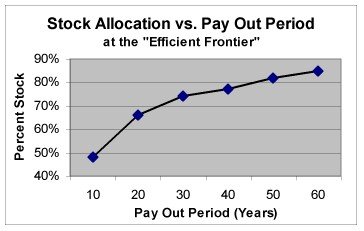Tiger said:
I have never seen an AA strategy that didn't consider cash as part of the portfolio be it money market, CDs or savings accounts so why do you not make it part of the portfolio?
For me cash represents my emergency fund which is a fixed figure plus moneys I am waiting to invest with so if the market drops I would be buying therefore reducing my cash position.
I also see where people here include their homes as part of their portfolio but from everything I have read and seen discussed homes, Social Security, pensions and pay shouldn't be included.
Read through and my post kind of explained why cash (in an emergency fund) should NOT be part of your allocation.
Asset allocation suggests a person has fixed percentages for each asset class. If one asset shrinks, another asset should be sold off or liquidated to maintain allocation (do you agree?). If one asset grows too much, it should be sold off to maintain allocation (do you agree?).
Most people I know would not liquidate their emergency fund or house to rebalance portfolio, therefore the emergency fund is NOT part of asset allocation.
For example
Let's say 60-30-10 for this discussion. Let's use a $1 M portfolio which is 600k equity, 300k bond and 100k cash. The 100k cash represents 75k of an emergency fund (12 months expenses for someone with variable income or self employed, for example) and 25k cash as part of 10% allocation.
If market tanks 20% and the 600k shrinks to 480k the portfolio is now 480-300-100 (54%-34%-11%). Sell off bonds (36k) and cash (12k) to rebalance to 528-264-88 (60-30-10).
The next year market falls another 30%. Portfolio is now 336k-264k-88k (688k). Sell off bonds (58k) and cash (19k) to rebalance to 413k-206k-69k (60-30-10).
At this point cash position has shrunk 31k. Less than one years expenses is now in cash. If market falls for a third year (20%)... the equity position is now 330k. bond position is 206k and cash is 69k (605k total). Rebalancing to 60-30-10 is 363k equity, 182k bond and 60k cash.
NO WAY should someone self employed have less than 1 years cash, IMO.
If you think drops in 3 consecutive years of 20%-30%-20% are not real, look at 2000-2002.
I'll throw another issue in- do you add your house into your allocation as a real estate position? If so, then you should sell your house when market crashes to reallocate and reduce your risk.
The house situation is silly- I'm not selling my house based on the stock market performance. I will also not upgrade my house if the market does well, either.
The emergency fund and house/ real estate positon help your net worth, they are not part of the asset allocation when you rebalance.
Cash can be part of asset allocation, but only if you will use the cash to buy in a down market.
FYI, I rebalance twice yearly. In June I adjust contribution %, and in January I set contributions back, then buy/sell as needed to keep all in line.

